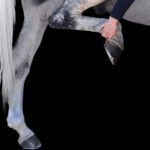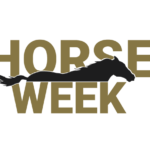
The yearning for a horse flowed so richly through her that she and her older sister would play as if they were the spirited fillies they so deeply longed to have.
On the rare occasions they were able to ride Thunder, a friend’s aging pony, his swayed back and homely appearance did not in any way diminish the girl’s thrill.
While their visits to Thunder were rare, the occasional opportunity of being with a real horse kept her dreams vibrant and alive, despite the fact her family couldn’t afford a horse of her own.
As the young girl grew up, and life unfolded before her, her ambitions for a horse slowly diminished and were replaced by the reality of college, a career, marriage and a family. While she still fancied the notion of being with a horse, she came to accept that now was not the time. Horses would have to wait . . .
Reminiscent stories of horse dreams and ambitions, such as this one, are sadly heard far too often. Did you, too, once have aspirations for equine experiences and even horse ownership? For the companionship of your own pony, whose sweet breath and soft presence could lull you to sleep, as well as kindle life into your spirit?
Fortunately, this story has a “Ride off into the sunset ending” as this particular horse- crazy girl went on to raise an equally horse-crazy daughter whose passion started her on a horse journey of her own. You see, the girl of this story is my mother, and I, her daughter, now have almost two decades into a life with horses where, as an instructor of horsemanship, I am blessed to make my living helping horses and humans connect.

After many years of waiting, my mother, now approaching her retired years, has found herself with the freedom of time and means that enable her to revisit her horse ambitions and fulfill her dream of partnership with a horse of her own.
Your experience likely differs some from the story of my mother, but I suspect there are more similarities than you’d care to admit. Your similarities lie in an unrequited desire born from the youthful dream to commune with the grandest of all animals, the horse. The majority of my clientele come bearing either unrealized horse dreams or having had some experience in their youth. In either circumstance, their burning desire to reconnect with a horse is alive and well.
It’s likely you are reading this today with a greater freedom on your hands than you have had until now. Career and family demands have eased and now it is finally your time to nurture your dream and let your fantasy become reality.
But where do you begin the daunting task of entering or re-entering the horse world? The abundance of disciplines, options and styles, not to mention a plethora of horse training and handling philosophies, is enough to overwhelm even the most fervent horse enthusiast.
My message to you is that you are not alone, nor do you have to do it alone. You no longer have to postpone your dreams. Here are some suggestions and practical ideas to help you make the most of your experience as you set sail on your horsemanship voyage!
Find the Right Instructor: Under all circumstances, but especially if you are new to horses, or have been out of the loop for some time, choosing an instructor who is a good fit to your goals and your learning style is paramount. To find one, search the Internet for instructors, stables or horse clubs in your area, as well as the phone book. Find the closest feed and tack store and ask for referrals, and call local equine vets. Never underestimate word of mouth-a good trainer will have established a positive reputation.
Look for someone who has demonstrated experience and enjoys instructing beginners on their quest for partnership with a horse. Do your research and ask lots of questions (see below for a list of suggested questions). Not every great horseman or horsewoman is also an effective teacher; and certainly not every good teacher is a savvy horseperson. To glean the most from your investment and time you want someone who is knowledgeable, talented and equipped in horsemanship and instruction. As well, pair yourself with someone who is approachable and demonstrates a teaching style and horsemanship philosophy that fits your personality.

Safety is Number One: I cannot emphasize enough the importance of your safety and the safety and well-being of any horse with which you work. You deserve to have your long-awaited experience with horses be positive and enjoyable, but that can’t happen without having confidence in your safety and safety in partnership with your horse under any circumstance, in any surrounding.
I regularly instill in my students the creed that we don’t practice safe habits for the expected, but rather we practice safe habits for the unexpected. Doing so necessitates a committed and diligent awareness of the happenings, energetic state and circumstances of both student and horse on the part of an instructor. Look for an instructor who is tuned in to the emotional state of human and horse, the environmental surroundings, and other influencing factors that may determine the success of your engagement with your horse.
Learn to Think Like a Horse: The greatest gift you can give yourself in this journey is to commit to the study of the language of the horse and the meaning of horse behavior. In doing this, you will learn to offer your equine partner an irresistible leadership, motivating your horse to join your herd.
Pair yourself with an instructor whose knowledge and philosophy display awareness of horse behavior and intellect, and a capacity for intuitively reading horses, as well as an awareness of your needs as a learner. Your instructor should be committed to the implementation of these philosophies in all areas of horsemanship. You will find that “taking the time it takes” to learn the language and needs of your horse will enable your growth as you and your horse begin to speak a cohesive language.
Pursue Partnership through Groundwork: Tragically, it continues to be the norm that being with horses generally means riding lessons that often constitute grabbing the horse, tacking up, and riding. In this scenario, the horse as an individual is overlooked and is instead treated only as a means to the human’s end. This situation hinders maximum safety, connection and pleasure for both parties.
Instead, I strongly recommend slowing down and allotting time for you and your horse to get a feel for one another. Find an instructor willing to teach you some groundwork exercises to do with your horse as a pre-ride check-up. The time to realize your horse is cranky, disrespectful or otherwise unwell is not once you are in the saddle. Establishing a respectful, cooperative partnership on the ground will enhance your safety and further your horse’s trust and responsiveness to you, while making for an enhanced experience when you do mount.
Furthermore, learning to communicate with the horse on the ground prior to riding will greatly enhance your own body awareness and ability to communicate succinctly, intentionally and effectively–skills that will earn your horse’s gratitude.

Embrace the Process: Lastly, embrace and accept yourself as you dive into the world of horsemanship. Truly refined horsemanship is a highly developed practice, and is to be revered as an art and a way of being, more than just a set of skills. To achieve partnership with a horse you need to develop a more attuned awareness of yourself and also learn a very different language and way of responding to the world than what we, as humans, find traditional.
I am confident that your pursuit of horsemanship can be one of the most rewarding endeavors of your life. Through a true partnership with a horse we can learn lessons about our potential, and ourselves, as well as experience real majesty and beauty.
However, as with learning any new skill or way of being, there will be clumsy, awkward and sticky places, too. My encouragement to you is to embrace your process, accept yourself as a learner, and acknowledge it as a journey for you and the horse as you transform and refine one another.
May your passion for horses finally be realized as you learn the ways of partnership, respect, willingness, cooperation and safety with a horse. Here’s to you!
Questions to Ask a Potential Instructor:
What mediums of learning do you incorporate into your teaching?
Could you describe your horsemanship philosophy? What about your teaching philosophy?
What types of clientele come to your barn?
How do you handle the safety of your students’ and the safety of the horses?
How does groundwork fit into your program?
Do you include horse psychology and behavior in your instruction?
May I have a list of references-not just training clients, but other professionals, such as veterinarians-who know you and can vouch for you?
May I watch you work with clients?
Questions to Ask Yourself:
Do I feel comfortable with this person?
Do the facilities appear well cared for, as well as safe and pleasant for horses and people?
Do the horses seem well? (An under fed horse, under socialized or otherwise unhappy horse will likely not be as safe to work with and will have more difficulty concentrating, trusting and entering a pleasurable relationship with you).
Can this person instruct me into a safe and respectful relationship with a horse through the means of groundwork and understanding of the horses’ language?
Check back next week for insights on horse behavior and herd dynamics.
About the author: Emily Johnson, owner of Mountain Rose Training, LLC, located in Broomfield, Colorado, is an accomplished horse professional with a passion for bringing horses and humans together. Many of her clients include women who are rediscovering their love of horses under Emily’s credible and approachable instruction.
Emily studied Equine Science at Colorado State University before spending the following years traveling, mentoring under many accomplished trainers nationwide, as she developed her own natural horsemanship style. Her training methods utilize a direct approach the horse naturally understands, which she combines with her knowledge of human learning to create the most effective environment for both.
Emily specializes in areas that include young or troubled horses, as well as horsemanship that emphasize the mind and behavior of the horse. Her instruction reflects her passion for equipping both horses and humans for success on their journey toward partnership. She may be contacted at mountainrosetraining@gmail.com.





